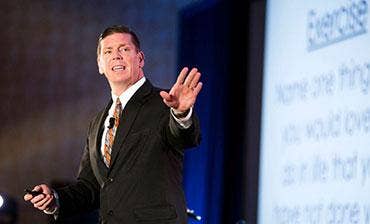No Gain If There's Too Much Pain: Performance Expert Teaches VARs To Prioritize Goals

Steve McClatchy knows a lot about setting priorities, and on Sunday the author of the best-selling book "Decide" shared his insights with solution providers for achieving success and fulfillment in their business and personal lives.
Delivering the opening keynote of The Channel Company's 2015 XChange Solution Provider conference in Dallas, McClatchy offered tips for simplifying the decisions we make all day, every day, and avoiding burnout as a result. The Channel Company is the publisher of CRN.
McClatchy, the founder of Aleer Training and Consulting, focuses his energies on training people -- including many leaders of Fortune 1000 businesses—to intelligently prioritize day-to-day activities in a way that improves performance and reduces overall stress.
[Related: Internet Of Things Might Be Greatest Risk To Security, Privacy: Sophos Researcher]
The trick, he told the XChange audience, is penciling into our busy schedules the tasks we don't have to do, but want to, and know will result in self-improvement. That's easier said than done -- the requirements of daily life, the barrage of tasks we have to complete in our businesses and our homes, never lets up.
"Every decision humans make is to move toward something you want, or prevent something you don't," McClatchy said.
It's gain vs. pain, and pain, as a motivator, has a natural advantage, McClatchy said.
"Gain tasks," by their very nature, aren't urgent -- they're the things we hope to do, one day, because we believe they will fulfill some deeper craving for satisfaction. But most of us just put them off.
But we don't have the luxury of putting off the pain tasks, from paying the bills to addressing customer complaints. In a sense, they're survival activities.
"There's never a moment in your business and your life when there's not a maintenance task to do," McClatchy said.
Survival activities have the nature that if you don't do them, someone will bring them to your attention, McClatchy explained.
No one will do that for gain activities. "If you don't attack them, they won't attack you," McClatchy told the audience.
In business, every system and process used to execute work, if it can be improved, it can wait until next week, McClatchy said.
"It’s the biggest dilemma we face," he told attendees. "If it can make things better, it can wait."
Gain tasks also have the unique quality of not being easy to delegate to others. Pain tasks are much easier to address by spending money, a form of delegation that saves time and procures superior quality.
NEXT: Scheduling, And Defending, Gain
While "pain tasks" have the natural advantage, it's important to keep in mind that emphasizing life's "gain" activities not only helps us improve as individuals and business leaders, but also instills in us a sense of balance, and therefore reduces stress, McClatchy told attendees.
"I think that feeling of excitement that something is getting better is specifically that feeling we call balance," McClatchy said.
There are two tools that help our brains decide the activities to which we will dedicate time: to-do lists and calendars.
Unfortunately, our daily to-do lists reflect our brains' emphasis on putting out fires; they're usually entirely focused on avoiding negative outcomes. That's our mindset at the very outset of most days, and we typically maintain it throughout the day, according to McClatchy.
People naturally place goals on to-do lists, he said, but they should consider placing their gain activities in their calendars instead.
Scheduling gain activities is the first piece of advice McClatchy offered solution providers. That’s a start to carving out time for goals that make you feel satisfied and unique as an individual.
Next, defend those activities by giving them precedence. Keep those appointments like you would a business meeting.
Finally, protect them from the other set of tasks -- those you do to prevent pain. Don't let your daily survival activities push them aside.
"I have all the things scheduled, and if I don't schedule them I get burned out," McClatchy said.
McClatchy's message resonated with Prashanth Vemuganti, president of Pantheon Solutions, an Iselin, N.J.-based VAR.
"A lot of us fall into that category," Vemuganti said. "We always try put out the fires first."
McClatchy summed up the dilemma better than Vemuganti had ever heard before, and he took McClatchy's suggestions for compartmentalizing life's tasks to heart.
"A lot of us are procrastinators. We wait, we think it's not a priority. That kind of gave me a lot of insight," Vemuganti told CRN. "Probably I'll change my strategy after listening to his presentation."
PUBLISHED MARCH 1, 2015